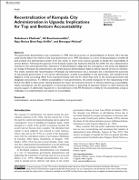| dc.contributor.author | Nabukeera, M. Sebyala | |
| dc.contributor.author | Bwengye, Micheal | |
| dc.contributor.author | Boerhannoeddin, Ali | |
| dc.contributor.author | Noriza, Raja | |
| dc.date.accessioned | 2020-11-22T06:59:53Z | |
| dc.date.available | 2020-11-22T06:59:53Z | |
| dc.date.issued | 2015-09 | |
| dc.identifier.citation | Madinah, N.(2016).Recentralization of Kampala City Administration in Uganda: Implications for Top and Bottom Accountability.SAGE Open. July-September 2015: 1 –13 . | en_US |
| dc.identifier.uri | http://ir.iuiu.ac.ug/xmlui/handle/20.500.12309/737 | |
| dc.description | The government disseminated a new constitution in 1995 with the provision on decentralization of Article 176 2 (b) that acted shortly before the rebirth of the local government act in 1997. Devolution as a form of decentralization transferred both political and administrative powers from the center to lower local councils specially to handle the responsibility of service delivery. | en_US |
| dc.description.abstract | The government disseminated a new constitution in 1995 with the provision on decentralization of Article 176 2 (b) that acted shortly before the rebirth of the local government act in 1997. Devolution as a form of decentralization transferred both political and administrative powers from the center to lower local councils specially to handle the responsibility of service delivery. Following the approval of the Kampala Capital City Authority (KCCA) Act 2010, the city’s administration reverted to the central government. Detractors of decentralization allege that the conveyance in the policy and legislation for change of Kampala city administration was timely because decentralization failed to deliver desired services to residents. This article contends that recentralization of Kampala city administration was a necessary evil, it decreased the autonomy of sub-national governments in civil service administration, eroded accountability to the electorates, and transferred the allegiance of the accounting officer from local governments with and for which they work to the central government that designates and positions. To inflame accountability in local governments, the article champions for the reexamining of the KCCA Act 2010 to allow power sharing between the mayor and executive director to enhance bottom-up accountability, checks and balances, and for participation of central government in appointing of executive director to allow financial and security support. It additionally requests for a reconsideration of the 9th Parliament to lobby for the amendments owing to challenges in its implementation and impact on accountability | en_US |
| dc.language.iso | en | en_US |
| dc.publisher | Sage | en_US |
| dc.subject | Recentralization | en_US |
| dc.subject | Service delivery | en_US |
| dc.subject | KCCA | en_US |
| dc.subject | Accountability | en_US |
| dc.subject | Local government | en_US |
| dc.title | Recentralization of Kampala City Administration in Uganda | en_US |
| dc.title.alternative | Implications for Top and Bottom Accountability | en_US |
| dc.type | Article | en_US |

